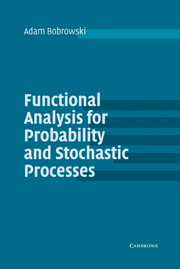Book contents
- Frontmatter
- Contents
- Preface
- 1 Preliminaries, notations and conventions
- 2 Basic notions in functional analysis
- 3 Conditional expectation
- 4 Brownian motion and Hilbert spaces
- 5 Dual spaces and convergence of probability measures
- 6 The Gelfand transform and its applications
- 7 Semigroups of operators and Lévy processes
- 8 Markov processes and semigroups of operators
- 9 Appendixes
- References
- Index
2 - Basic notions in functional analysis
Published online by Cambridge University Press: 14 January 2010
- Frontmatter
- Contents
- Preface
- 1 Preliminaries, notations and conventions
- 2 Basic notions in functional analysis
- 3 Conditional expectation
- 4 Brownian motion and Hilbert spaces
- 5 Dual spaces and convergence of probability measures
- 6 The Gelfand transform and its applications
- 7 Semigroups of operators and Lévy processes
- 8 Markov processes and semigroups of operators
- 9 Appendixes
- References
- Index
Summary
A characteristic of functional analysis is that it does not see functions, sequences, or measures as isolated objects but as elements or points in a space of functions, a space of sequences, or a space of measures. In a sense, for a functional analyst, particular properties of a certain probability measure are not important; rather, properties of the whole space or of a certain subspace of such measures are important. To prove existence or a property of an object or a group of objects, we would like to do it by examining general properties of the whole space, not by examining these objects separately. There is both beauty and power in this approach. We hope that this crucial point of view will become evident to the reader while he/she progresses through this chapter and through the whole book.
Linear spaces
The central notion of functional analysis is that of a Banach space. There are two components of this notion: algebraic and topological. The algebraic component describes the fact that elements of a Banach space may be meaningfully added together and multiplied by scalars. For example, given two random variables, X and Y, say, we may think of random variables X + Y and αX (and αY) where α ∈ ℝ. In a similar way, we may think of the sum of two measures and the product of a scalar and a measure. Abstract sets with such algebraic structure, introduced in more detail in this section, are known as linear spaces. The topological component of the notion of a Banach space will be discussed in Section 2.2.
- Type
- Chapter
- Information
- Functional Analysis for Probability and Stochastic ProcessesAn Introduction, pp. 37 - 79Publisher: Cambridge University PressPrint publication year: 2005



